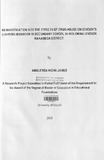| dc.description.abstract | Drug abuse the world over is increasingly becoming a global problem which threatens to tear the social fabric
of the society. The drug abuse menace has affected the youth particularly in Africa. The effects of drug
abuse have been felt in many learning institutions the world over. The study is aimed at investigating the effects
of drug abuse on students' learning behavior in Ikolomani division of Kakamega District. In order to carry out
this study research objectives and subsequent research questions were developed. The major objectives of
the study were to find out the effects of drug abuse on students' learning behavior.
Literature related to the study was reviewed and a research methodology was selected. The ex-post facto
design of study was used to carry out the research and a target population of 143 teachers and 244 students
was randomly selected from the population. Questionnaires were developed and administered to the
respondents after validation.
The major findings of the study were that drug abuse negatively affected students learninq behavior through
lack of concentration in class, poor condition, absenteeism both from class and from school, rudeness to
teachers and low self esteem which leads to poor performance. The study found that the sources of drugs in
schools were fellow students, outsiders, school Workers and friends. It was found that both teachers and
students were aware that there was high availability of drugs in school. However, the school administration
has employed concerted efforts to curb the menace. It was found that the most commonly abused drugs in
school included cigarettes, alcohol, opium and kuber. The factors which influence drug abuse among
students were found to be peer pressure, broken families, frustration and boredom among the students. One
outstanding factor that was found to influence drug abuse among students was the large amount of pocket
money given to students by parents, guardians and others
The study found out that abuse of drugs among students attect their learning behavior. The effects are
depicted through poor performance in internal and external examinations. The study also concludes that the
effects of drugs among students manifest themselves in form of observable behaviors. These include
student's rudeness to teachers, aggressive behavior, absenteeism, lateness, striking and disorganization.
The study concludes that the major cause of drug abuse among students is peer pressure. However other
causes of drug abuse include too much money given to students by parents as pocket money.. loss of
parents therefore exposing the students to influence from other people ,boredom, too much work and
availability of drugs within the vicinity of the schools, the community surrounding the school, the school
canteen ,visitors and surrounding bushes and forests.
From the findings of the study, the following recommendations have been suggested. The study
recommends that school authorities should lay down mechanisms to reduce drug abuse among students in
school. These mechanisms include vetting all visitors to the school, severe punishment to drug abusers with
a view of transforming them into better students. Ultimately, the schools should build internal capacity in
guidance and counseling and institutionalize guidance and counseling in the school. In addition, the schools
should outsource specialists in guidance an'a counseling to supplement the efforts of teachers. Teachers
should be role models to students by adhering to their code of ethics. The study recommends a broad based
approach high on Christian and other religious doctrines to stamp out drug abuse among students. It also
suggests that parents should be advised against providing 100 much pocket money to students. Proper
engagement of students in school is recommended in order to have them occupied in both academic and cocurricula
activities. These could be in form of religious organization and other activities such as clubs,
educational tours and trips. Recommended also is the introduction of specialized education on drugs in
school programs to expose them to the negative effects o.f druqs .
In general, the study recommends that the above mechanisms be put in place in order to reduce prevalence
of drugs in schools. A collaborative approach to this issue should be taken involving all the stakeholders in
addressing the drug abuse menace. | en |

